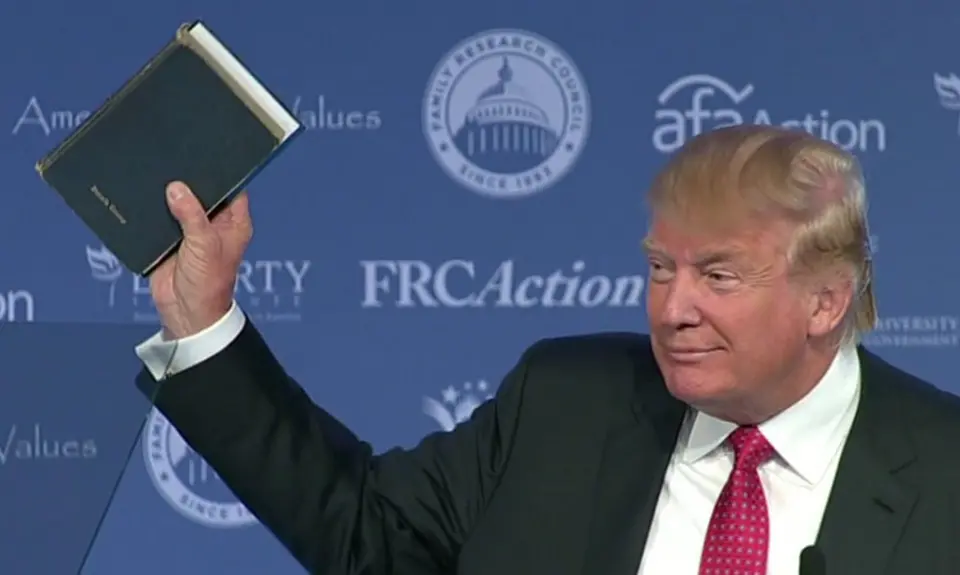A national campaign to undermine church-state separation—Project Blitz—encourages like-minded state lawmakers to introduce legislation designed to move more of the Religious Right’s worldview into law—and into public schools. This week President Trump gave an endorsement-by-tweet to one specific Project Blitz goal—getting more public schools to teach about the Bible.
There are many reasons to be deeply skeptical of the current push by right-wing organizations for more Bible teaching in public schools. Religious Right activists have turned public schools into culture-war battlegrounds, routinely denouncing Supreme Court rulings from the 1960s that upheld church-state separation by forbidding state-sponsored prayer and devotional Bible readings in public schools.
One of Project Blitz’s promoters is “historian” David Barton, a Republican political activist whose WallBuilders organization promotes a Christian-nation approach to U.S. history that has been widely discredited by actual historians. Making the Bible a primary textbook in American public schools is one of the goals of Christian nationalist political operative David Lane, who hosted President Trump at one of his events during the 2016 presidential campaign.
Earlier this month, controversial Florida legislator and pastor Kimberly Daniels filed HB 195, legislation that would amend a current state law that permits school districts to offer elective Bible classes. Daniels’ bill would require every school district in the state to offer a set of courses about religion, the Hebrew scriptures, and the Christian Bible. Daniels, a self-described “demon buster” and “apostle,” has sponsored other Project Blitz legislation, including a bill to require public schools to post “In God We Trust” in “a conspicuous place.” (That legislation became law last year.) God TV celebrated the introduction of Daniels’ new bill, saying it brought Florida “[o]ne step close to seeing prayer in public schools again.”
Courts have ruled that teaching about the Bible—as literature, for example, or as comparative religion—is constitutional in public schools, but using the Bible for indoctrination or proselytizing is not. Teaching about the Bible’s role in history is permissible; teaching the Bible as if its stories are factual history is not.
In order to help school officials understand and navigate these tricky legal waters, People For the American Way Foundation worked with scholars and organizations across the political spectrum to produce “The Bible & Public Schools: a First Amendment Guide,” which was published in 1999 by the Freedom Forum’s First Amendment Center and the National Bible Association. The guide makes clear that teaching the Bible in public schools in a neutral and academic way requires a serious commitment to, among other things, the selection and training of qualified teachers.
It’s not easy to do correctly, especially if there’s no will or effort to do so.
In 2000, People For the American Way Foundation published “The Good Book Taught Wrong,” the results of an in-depth investigation of the way “Bible History” was being taught in 14 Florida school districts. The investigation, grounded in written course materials obtained by PFAW Foundation, documented that all of the school districts had been “violating the U.S. Constitution by teaching the Bible from a religious perspective—often assuming teachers and students were Christian—or using the Bible as if it were a history textbook or otherwise failing to provide objective and secular instruction.”
Among the details included in the PFAWF report were this question which appeared on tests in two high schools: “Why is it hard for a non-Christian to understand things about God?” Another high school exam question asked, “If you had a Jewish friend who wanted to know if Jesus might be the expectant [sic] Messiah, which book [of the Gospels] would you give him?” Another lesson asked, “Who, according to Jesus is the father of the Jews?” The answer: “The devil.”
The Texas Freedom Network Education Fund has published multiple reports on the way Bible classes have been taught in that state’s public schools. Southern Methodist University religious studies professor Mark Chancey has documented that classes were being taught from a right-wing fundamentalist Christian standpoint, including a literal interpretation of the Bible, with materials “designed to evangelize rather than provide an objective study of the Bible’s influence.”
In addition, noted Chancey in a report originally published in 2006, Bible courses often fostered “notions of American identity as distinctively Christian,” using videos and materials from Barton’s WallBuilders. Chancey described WallBuilders’ “America’s Godly Heritage” video as “so inaccurate in its content and so unabashedly sectarian in its goals that one federal court has prohibited its use in public schools.”
Daniels’ new bill requiring all Florida school districts to offer multiple courses on the Bible includes language stipulating that the courses must maintain religious neutrality and not promote or disfavor any particular religious outlook. That’s a good thing. But as the PFAWF and TFN studies make clear, it’s one thing to require neutrality, and it’s another thing to ensure that course materials, teacher training, and actual classroom practice reflect those legal requirements.
If states continue to expand teaching about the Bible in public schools, there will be a lot of work for parents, teachers and other concerned individuals to make sure that public officials are providing oversight and accountability to ensure that schools are respecting the Constitution as well as the rights of all students.






